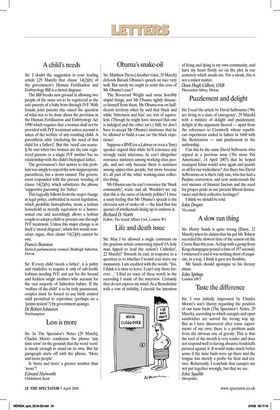A child’s needs
Sir: I doubt the suggestion in your leading article (29 March) that clause 14(2)(b) of the government’s Human Fertilisation and Embryology Bill is a moral disgrace.
The Bill breaks new ground in allowing two people of the same sex to be registered as the sole parents of a baby born through IVF. With female joint parents this raised the question of what was to be done about the provision in the Human Fertilisation and Embryology Act 1990 which requires that a woman shall not be provided with IVF treatment unless account is taken of the welfare of any resulting child. A parenthesis adds ‘(including the need of that child for a father)’. But this ‘need’ can scarcely be met when two women are the sole registered parents or a single IVF mother has no relationship with the child’s biological father.
The government’s first answer to this problem was simply to repeal the now inappropriate parenthesis, but a storm ensued. The government responded with the present wording of clause 14(2)(b), which substitutes the phrase ‘supportive parenting’ for ‘father’.
This logically follows from the major change in legal policy, embedded in recent legislation, which prohibits homophobia, treats a lesbian household as morally equivalent to a heterosexual one and accordingly allows a lesbian couple to adopt a child or procure one through IVF treatment. Unless this major change is in itself a ‘moral disgrace’, which few would nowadays argue, then clause 14(2)(b) cannot be one.
Francis Bennion
Retired parliamentary counsel, Budleigh Salterton, Devon
Sir: If every child ‘needs a father’, it is paltry and vindictive to require it only of sub-fertile lesbians needing IVF, and not for the fecund and feckless single mothers who account for the vast majority of fatherless babies. If the ‘welfare of the child’ is to be truly paramount, couples must be forced to use birth control until permitted to reproduce (perhaps on a ‘points system’?) by government quango.
Dr Robert Johnston
Northampton
Less is more
Sir: In The Spectator’s Notes (29 March), Charles Moore condemns the phrase ‘any time soon’ on the grounds that the word ‘soon’ is sturdy enough to stand on its own. But his paragraph starts off with the phrase, ‘More and more people’.
Is ‘more and more’ a greater number than ‘more’?
Edward Hurworth
Chislehurst, Kent


































































 Previous page
Previous page